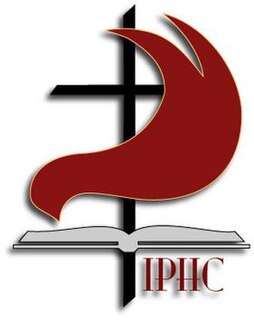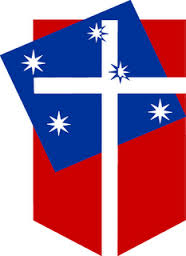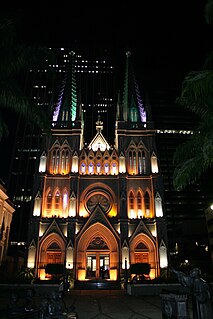
Pentecostalism or Classical Pentecostalism is a Protestant Christian movement that emphasises direct personal experience of God through baptism with the Holy Spirit. The term Pentecostal is derived from Pentecost, an event that commemorates the descent of the Holy Spirit upon the followers of Jesus Christ, and the speaking in "foreign" tongues as described in the second chapter of the Acts of the Apostles. In Greek, it is the name for the Jewish Feast of Weeks.

The Assemblies of God (AG), officially the World Assemblies of God Fellowship, is a group of over 144 autonomous self-governing national groupings of churches that together form the world's largest Pentecostal denomination. It is the fourth largest international Christian group of denominations.

The International Pentecostal Holiness Church (IPHC) or simply Pentecostal Holiness Church (PHC) is a Pentecostal Christian denomination founded in 1911 with the merger of two older denominations. Historically centered in the Southeastern United States, particularly the Carolinas and Georgia, the Pentecostal Holiness Church now has an international presence. In 2000, the church reported a worldwide membership of over one million—over three million including affiliates.
The God is Love Pentecostal Church (IPDA) is a Pentecostal Christian denomination in Brazil. The headquarters is in São Paulo.

The Christian Congregation in Brazil was founded in Brazil by the Italian-American missionary Luigi Francescon (1866–1964), as part of the larger Christian Congregation movement.

Christianity is the largest religion in Brazil, with Catholics having the most adherents. Brazil possesses a richly spiritual society formed from the meeting of the Catholic Church with the religious traditions of African slaves and indigenous people. This confluence of faiths during the Portuguese colonization of Brazil led to the development of a diverse array of syncretistic practices within the overarching umbrella of Brazilian Catholicism, characterized by traditional Portuguese festivities. Until recently Catholicism was overwhelmingly dominant. Rapid change in the 21st century has led to a growth in secularism, and Evangelical Protestantism to over 22% of the population. The 2010 census indicates that under 65% of Brazilians consider themselves Catholic, down from 90% in 1970, leading Cardinal Cláudio Hummes to comment, "We wonder with anxiety: how long will Brazil remain a Catholic country?." despite falling in most of the country, Catholicism remains strong in most of the Northeast.

Itu is an historic municipality in the state of São Paulo in Brazil. It is part of the Metropolitan Region of Sorocaba. The population is 175,568 in an area of 640.72 km2. The elevation is 583 m. This place name comes from the Tupi language, meaning big waterfall. Two rivers flow through Itu: Tietê and Jundiaí. Itu has five hospitals, eleven bank agencies and one shopping center, the Plaza Shopping Itu.
The Universal Church of the Kingdom of God (UCKG) is an evangelical charismatic Christian denomination with its headquarters at the Temple of Solomon in São Paulo, Brazil. The church was founded in 1977 in Rio de Janeiro by Bishop Edir Macedo, owner of the multi-billion television company RecordTV.

RecordTV is a Brazilian free-to-air commercial television network established on September 27, 1953 as TV Record by the businessman and media personality Paulo Machado de Carvalho.

The Brazilian Catholic Church, or Catholic Church in Brazil, is part of the worldwide Catholic Church, under the spiritual leadership of the Pope in Rome, and the influential National Conference of Bishops of Brazil, composed of over 400 primary and auxiliary bishops and archbishops. There are over 250 dioceses and other territorial jurisdictions in Brazil. The primate of Brazil is Dom Murilo Ramos Krieger.

The Anglican Episcopal Church of Brazil is the 19th province of the Anglican Communion, covering the country of Brazil. It is composed of nine dioceses and one missionary district, each headed by a bishop, among whom one is elected as the Primate of Brazil. The current Primate is Francisco de Assis da Silva, from the South-West Diocese, elected in 2013. IEAB is the oldest non-Roman Catholic church in Brazil, originating from the Treaty of Commerce and Navigation signed in 1810 between Portugal and the United Kingdom which allowed the Church of England to establish chapels in the former Portuguese colony. In 1890 American missionaries from the Episcopal Church established themselves in the country aiming to create a national church; unlike the English chapels, they celebrated services in Portuguese and converted Brazilians. The Anglican community of Brazil was a missionary district of the Episcopal Church until 1965, when it gained its ecclesiastical independence and became a separate province of the Anglican Communion. Twenty years later, IEAB began to ordain women. It preaches a social gospel, being known for its commitment to fight against problems that affect vast portions of the Brazilian society, such as social inequality, land concentration, domestic violence, racism, homophobia and xenophobia. Its stance as an Inclusive Church has caused both schisms and the arrival of former Roman Catholics and Evangelicals in search of acceptance.

The Assembleias de Deus are a group of Pentecostal denominations in Brazil founded by Daniel Berg and Gunnar Vingren, who came to Brazil as missionaries from the Swedish Pentecostal movement. The Assembleias de Deus are related to the worldwide Pentecostal movement, and some groups are affiliated with the Assemblies of God. Currently, the organization is one of the largest Protestant denominations worldwide.
The Igreja Renascer em Cristo or Reborn in Christ Church is an Evangelical Christian church in São Paulo.

Protestantism in Brazil began in the 19th century, and grew in the 20th century after restrictions against Protestants were abolished throughout Latin America. The 2010 Census reported that 22.2% of the Brazilian population is Protestant, about 44 million people, making it one of the world's largest concentrations of Protestants. Brazilian Protestantism is primarily represented by Evangelical Protestant and Pentecostal churches, and a smaller proportion of Baptists. The remainder is made up of Lutherans, Adventists, Presbyterians and other mainline Protestant traditions.

The Adventist Church of Promise is an evangelical Christian denomination which is both Sabbatarian Adventist and classical Pentecostal in its doctrine and worship. It was founded in Brazil in 1932 by pastor John August Silveira, as a split-off from the Seventh-day Adventist Church.

The Presbyterian Church of Brazil is an Evangelical Protestant Christian denomination in Brazil. Oldest of the Reformed family of Protestantism in Brazil. It is the largest Presbyterian denomination in the country, having an estimate 649,510 members, 4,475 ordained ministers and 5,068 churches and parishes. It is also the only Presbyterian denomination in Brazil present in all 26 States and the Federal District. It was founded by the American missionary Rev. Ashbel Green Simonton, who also oversaw the formal organization of the first congregation and the first Presbytery. Although the Presbyterian Church of Rio de Janeiro was only formally organized in January 1863, and the Brazilian church only left the jurisdiction of the joint missions board of the American churches in 1888, when the Synod was formed, the denomination considers the date of Simonton's arrival in Brazil, August 12, 1859, as its foundation date.
The Conservative Presbyterian Church in Brazil is a confessional Reformed denomination, founded in the mid-1900s.

Apostolic Church Fullness of God's Throne is a Neo-charismatic denomination founded in Brazil in 2006, by Agenor Duque and Ingrid Duque.
The Pentecostal church is the fastest-growing Christian denominations in Brazil. The largest denomination is Roman Catholic, but as the results of 2016 an estimate 12% of Brazilians are Pentecostal Christians. At some points, churches were appearing as rapidly as one church per day. The growing movement in Brazil traces its roots to the Azusa Street Revival in 1906 in Los Angeles and, like Pentecostal movements in other countries, emphasizes a second act of grace following conversion that results in gifts of the Spirit such as glossolalia and healing.
Charismatic Christianity is a form of Christianity that emphasizes the work of the Holy Spirit, spiritual gifts, and modern-day miracles as an everyday part of a believer's life. Practitioners are often called Charismatic Christians or Renewalists. Although there is considerable overlap, Charismatic Christianity is often categorized into three separate groups: Pentecostalism, the Charismatic movement and Neo-charismatic movement. The movements are distinguished from Pentecostalism by not making the act of speaking in tongues necessary for evidence of Spirit baptism, giving prominence to a diversity of spiritual gifts. According to the Pew Research Center, Pentecostals and Charismatic Christians numbered over 584 million or a quarter of the world's 2 billion Christians in 2011.












